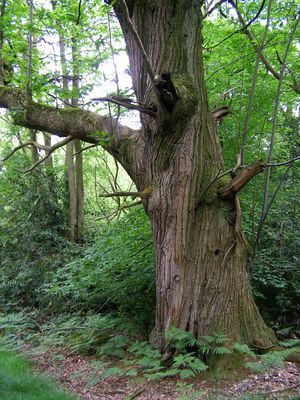Note: This is a project under development. The articles on this wiki are just being initiated and broadly incomplete. You can Help creating new pages.
Difference between revisions of "Castanea sativa - Sweet chestnut"
(→Uses) |
|||
| Line 6: | Line 6: | ||
==Uses== | ==Uses== | ||
| − | {{Uses|Bleeding}}, {{Uses|fevers}}, {{Uses|Ague}}, {{Uses|coughs}}, {{Uses|Rheumatism}}, {{Uses|joint pain}}, {{Uses|Diarrhea}}, {{Uses|Sore throats}} | + | {{Uses|Bleeding}}, {{Uses|fevers}}, {{Uses|Ague}}, {{Uses|coughs}}, {{Uses|Rheumatism}}, {{Uses|joint pain}}, {{Uses|Diarrhea}}, {{Uses|Sore throats}} |
==Parts Used== | ==Parts Used== | ||
Revision as of 15:01, 28 April 2018
Castanea sativa is a species of Flowering plant in the family Fagaceae. It is native to Europe and Asia Minor. It is widely cultivated throughout the temperate world.
Contents
Uses
Bleeding, fevers, Ague, coughs, Rheumatism, joint pain, Diarrhea, Sore throats
Parts Used
Chemical Composition
They contained (g/100g dry matter basis) total carbohydrates 75.32 - 86.31, total sugar 10.32 - 22.79, invert sugar 0.08 - 1.25, starch 54.45 - 69.70, sucrose 8.86 - 21.28, ash 1.02 - 3.22, crude cellulose 3.58 - 5.96, total fat 0.49 - 2.01, total protein 4.88 - 10.87[1]
Common names
| Language | Common name |
|---|---|
| Kannada | |
| Hindi | |
| Malayalam | |
| Tamil | |
| Telugu | |
| Marathi | NA |
| Gujarathi | NA |
| Punjabi | NA |
| Kashmiri | NA |
| Sanskrit | |
| English | Agrimony |
Habit
Identification
Leaf
| Kind | Shape | Feature |
|---|---|---|
| Simple | there is one leaf per node along the stem and the edge of the leaf blade has teeth |
Flower
| Type | Size | Color and composition | Stamen | More information |
|---|---|---|---|---|
| Bisexual | 2-4cm long | brown | 5 | These catkins are 10 to 20 cm long and appear in late June to July |
Fruit
| Type | Size | Mass | Appearance | Seeds | More information |
|---|---|---|---|---|---|
| general | the fruit is dry but does not split open when ripe | the bark of an adult plant is ridged or plated | {{{6}}} |
Other features
List of Ayurvedic medicine in which the herb is used
- Vishatinduka Taila as root juice extract
Where to get the saplings
Mode of Propagation
How to plant/cultivate
Prefers a good well-drained slightly acid loam in a sunny position but it also succeeds in dry soils[3]
Commonly seen growing in areas
Mountain area, meadows, Borders of forests and fields.
Photo Gallery
References
External Links
- Pages that are stubs
- Ayurvedic Herbs known to be helpful to treat Bleeding
- Ayurvedic Herbs known to be helpful to treat fevers
- Ayurvedic Herbs known to be helpful to treat Ague
- Ayurvedic Herbs known to be helpful to treat coughs
- Ayurvedic Herbs known to be helpful to treat Rheumatism
- Ayurvedic Herbs known to be helpful to treat joint pain
- Ayurvedic Herbs known to be helpful to treat Diarrhea
- Ayurvedic Herbs known to be helpful to treat Sore throats
- Herbs with Seeds used in medicine
- Herbs with Bark used in medicine
- Herbs with common name in English
- Habit - Tree
- Index of Plants which can be propagated by Seeds
- Index of Plants which can be propagated by Cuttings
- Herbs that are commonly seen in the region of Mountain area
- Herbs that are commonly seen in the region of meadows
- Herbs that are commonly seen in the region of Borders of forests and fields
- Herbs



